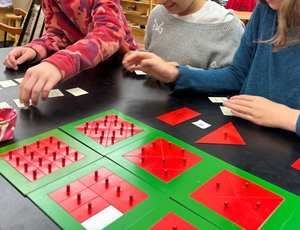Facing Frustration & Flipped Lids

You’ve experienced the scene before. All is quiet and calm. The kids are playing outside. Maybe you are even focused on something you’ve wanted to do for a while. And the next thing you know the door slams open and everyone comes in, teeming with frustration.
At first, you may try to piece together the details: a game, something stolen, someone who felt excluded, others defending their territory. Removed from the situation, you can probably see the dynamics at play: someone felt left out and wanted to belong but didn't know how to ask, so they do something that gets them some negative attention.
Feeling Disconnected
Our children don't necessarily use the most constructive ways to let us know what they need. Rather than say, "I feel disconnected, and I need some extra love and attention," they are more likely to hit or throw tantrums or, as they get older, say or do mean things to get us to notice. In our imaginary scene, a child who wanted to belong decided to take something to get the other children to pay attention.
In situations like this, other kids typically don’t respond well. They get defensive and usually respond with a fair amount of their own fury. When children retaliate, they aren’t thinking about any consequences of their actions, much less about another child's motivations! Even if we try to listen and have a conversation about what happened, children will often tend to become inflamed again.
Shifting Gears
This is when it is helpful to remember that we can shift gears to help children understand what is actually happening in their brains! Ideally, we find something that children can relate to and that changes their focus.
A pet reptile is an excellent option. “So you remember the gecko we saw at the pet store? She has a very basic response. If threatened, she has three options: to fight, to freeze, or to flee.” From there, we can explain how we all have a very reptilian part of our brain, the amygdala. When we feel threatened, we tend to go back to basic responses: fight, freeze, or flee.
Flipping Our Lid
We also have our frontal lobes, which allow us to think more logically and consider other options. Despite having a rational part of our brain, it is easy to do what Daniel Siegel has termed "flipping our lid."
We can show children what this is like by representing our brain with our hand. When we curl our thumb into our palm it is like the amygdala, a primitive part of our brain essential for basic functions. The amygdala is our alarm center and responds from a place of instinct. Then we can curl our fingers over our thumb so they can represent the frontal lobes of our brain, which help us with self-control, empathy, and decision-making.
When we get upset, we can "flip our lid." Our fingers (representing our frontal lobes) fly up and are out of commission, leaving our thumb (representing our amygdala) exposed. When this happens, we tend to act from the more reptilian part of our brain.
Getting Curious
When we provide this model for children, they often focus intensely on how our brains function. Yet there is still a challenge: What should we do when we are intensely upset, have a flipped lid, and are in the midst of a challenging moment?
It helps to really sit with the question with our children and lean into a place of curiosity. What if we had a plan for when we get into these kinds of moments? What if others around us were able to do this, too? What if our communities, our governments, and our countries were able to manage flipped lids? What kind of world would we experience?
When given the opportunity to explore options together, our children tend to rise to the occasion. They might decide to use each other for support when they feel overwhelmed by feelings of anger or frustration. They might also begin to think more about others’ needs and how to help them feel more included. Our children are so capable of moving from a place of not knowing to taking initial steps to figure out their own plan of action. While our children won’t have all the answers, we can help them carefully consider how to manage themselves in the face of challenges.
Curious to learn more about how we help children we confront frustration, recognize the need to belong, and even just manage overstimulation? Schedule a tour and see for yourself how Montessori helps us all grow in beautiful ways!






